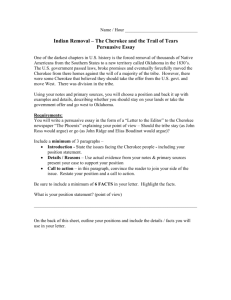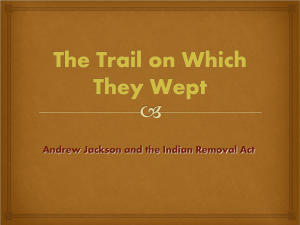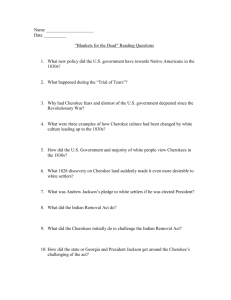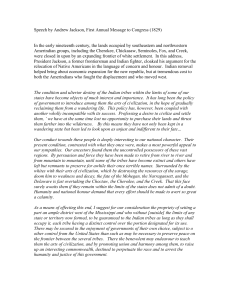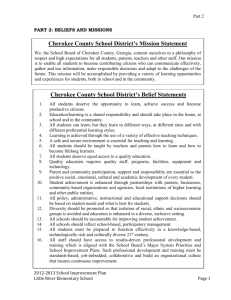The Marshall Trilogy: A Tribal Perspective In United States history
advertisement
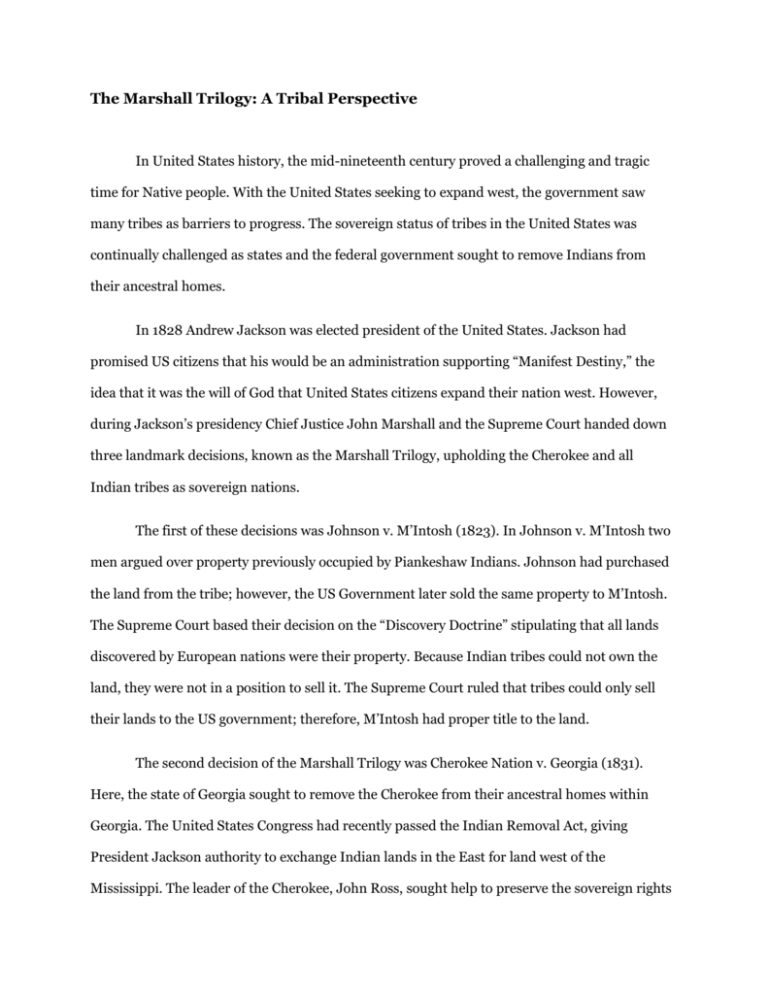
The Marshall Trilogy: A Tribal Perspective In United States history, the mid-nineteenth century proved a challenging and tragic time for Native people. With the United States seeking to expand west, the government saw many tribes as barriers to progress. The sovereign status of tribes in the United States was continually challenged as states and the federal government sought to remove Indians from their ancestral homes. In 1828 Andrew Jackson was elected president of the United States. Jackson had promised US citizens that his would be an administration supporting “Manifest Destiny,” the idea that it was the will of God that United States citizens expand their nation west. However, during Jackson’s presidency Chief Justice John Marshall and the Supreme Court handed down three landmark decisions, known as the Marshall Trilogy, upholding the Cherokee and all Indian tribes as sovereign nations. The first of these decisions was Johnson v. M’Intosh (1823). In Johnson v. M’Intosh two men argued over property previously occupied by Piankeshaw Indians. Johnson had purchased the land from the tribe; however, the US Government later sold the same property to M’Intosh. The Supreme Court based their decision on the “Discovery Doctrine” stipulating that all lands discovered by European nations were their property. Because Indian tribes could not own the land, they were not in a position to sell it. The Supreme Court ruled that tribes could only sell their lands to the US government; therefore, M’Intosh had proper title to the land. The second decision of the Marshall Trilogy was Cherokee Nation v. Georgia (1831). Here, the state of Georgia sought to remove the Cherokee from their ancestral homes within Georgia. The United States Congress had recently passed the Indian Removal Act, giving President Jackson authority to exchange Indian lands in the East for land west of the Mississippi. The leader of the Cherokee, John Ross, sought help to preserve the sovereign rights of the Cherokee to remain on their land. Ross claimed that because the Cherokee were a sovereign nation, their rights as an independent nation superseded the laws of the state of Georgia. The case was brought before the Supreme Court, which upheld the right of Georgia to remove the Cherokee from their lands. The court found that the Cherokee were a domestic dependent nation, over which the courts had no original jurisdiction, meaning they did not have the power to make a ruling in the case. However, the Court did leave open the possibility that it could find in favor of the Cherokee if there was an appeal from a lower court. The final case in the Marshall Trilogy was Worcester v. Georgia (1832). Here, Marshall and the Supreme Court held that the Cherokee had a right to expect the US government’s protection when faced with actions by states which interfered with the Cherokee’s sovereign rights. The court determined that the Cherokee were a “distinct community” and that Georgia could not impose their laws on the Cherokee. This was a major shift from the court’s decisions in both Johnson v. M’Intosh and Cherokee Nation v. Georgia. Because the Supreme Court did not immediately order the US Government to send federal marshals to immediately enforce the court’s decision, the state of Georgia ignored the decision and proceeded to remove the Cherokee. Jackson, who supported Georgia in its removal of the Cherokee, did not intervene. The United States government’s tacit refusal to recognize Indian sovereignty led in 1838 to the Trail of Tears - a march from ancestral homelands toward the West. This death march resulted in the deaths of approximately 4000 Cherokee, primarily the elderly and children. Reflection questions: 1) According to the newsletter, why was the mid-nineteenth century so difficult for Indian people? 2) How did the United States view Indian tribes? 3) In your own words, define “Manifest Destiny”: 4) What is the “Discovery Doctrine?” How was it used by the courts in Johnson v. M’Intosh? 5) Look up and write down the definitions of the following words as they apply to Indian tribes: a) Sovereign: b) Supersede: Now that you know the meaning of those words, what do you think it meant when Cherokee Chief John Ross claimed that because the Cherokee were a sovereign nation, their rights as an independent nation superseded the laws of the State of Georgia? 6) In Worcester v. Georgia, what did the court say the Cherokee should expect from the US government when faced with states trying to take their land and resources? 7) What was the result of the US government, specifically President Jackson, refusing to enforce the law protecting the Cherokee? 8) Do you believe the Cherokee were treated fairly? 9) Why might it be important for the president to follow the law?

